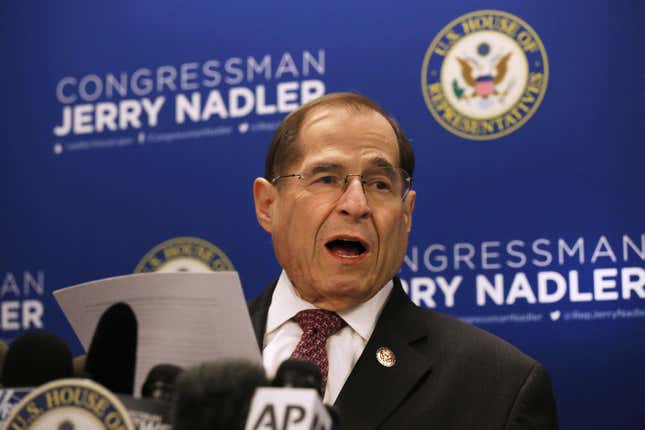
On Thursday, Attorney General William Barr held a press conference early in the morning to tell everyone how much he loves and respects the president. Fine, he held a press conference...who knows why he held a damn press conference, but he did and it was stupid.
Then he released a redacted version of Special Counsel Robert Mueller’s report to the general public and Congress. Congress got all up in their feelings, and rightfully so, because they are a governmental branch of elected officials being treated like regular folks so now, House Judiciary Committee Chairman Jerrold Nadler, D-N.Y., on Friday subpoenaed the Justice Department for the original Robert Mueller diss track and not the William Barr remix.
And Nadler said that they have until May 1.
“I am open to working with the Department to reach a reasonable accommodation for access to these materials, however I cannot accept any proposal which leaves most of Congress in the dark, as they grapple with their duties of legislation, oversight and constitutional accountability,” he said Friday, NBC News reports.
Congress wants to see all of the shadiness without the black lines so they can determine exactly how far Trump worked to soil the special counsel’s probe into Russia attempts to steal the 2016 election.
NBC News notes that the report released by Barr contained some 1,000 redactions, with seven pages entirely blacked out.
Rep. Doug Collins, R-Ga., the ranking member of the House Judiciary Committee, called Nadler’s subpoena “wildly overbroad” and added that the date was “politically convenient” given that Barr had offered to appear before the committee on May 2, NBC News reports.
“The chairman’s process flies in the face of normal and proper congressional oversight. I urge Chairman Nadler to narrowly tailor his subpoena and give the department a meaningful chance to respond,” Collins said in a statement Friday, according to NBC News.
Barr reportedly sent a letter to Nadler and Senate counterpart, Judiciary Committee Chairman Lindsey Graham (R-S.C.), noting that a less redacted version of the report would be available next week in a “secure reading room.”
While not one Democrat has said this, I assure that at least three are thinking, “Fuck your reading room and your less redactedness! We said the full report without blurred lines (no Robin Thicke)!”
Following the release of the over 400-page report Thursday, Nadler said it outlines “disturbing evidence that President Trump engaged in obstruction of justice and other misconduct” and that Congress now has the responsibility to hold the president accountable, NBC News reports.
Nadler also wants Mueller in front of Congress to testify ASAP “in any event, no later than May 23, 2019,” tweeting that lawmakers “need to hear directly from special counsel Mueller and receive the full, unredacted report with the underlying evidence.”
Who knows how all of this will play out. Many believe that because Barr is so firmly in the president’s pocket, the potential release of the full report to Congress without any redactions could be decided in the courts.

